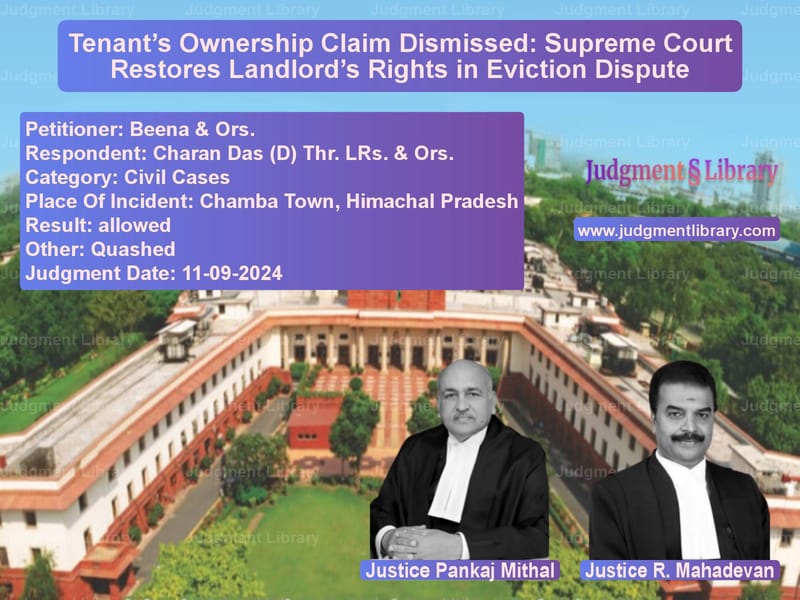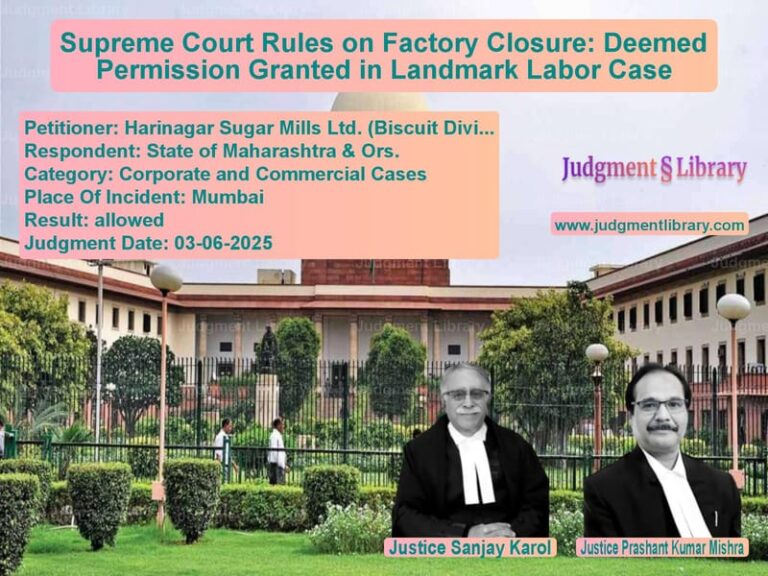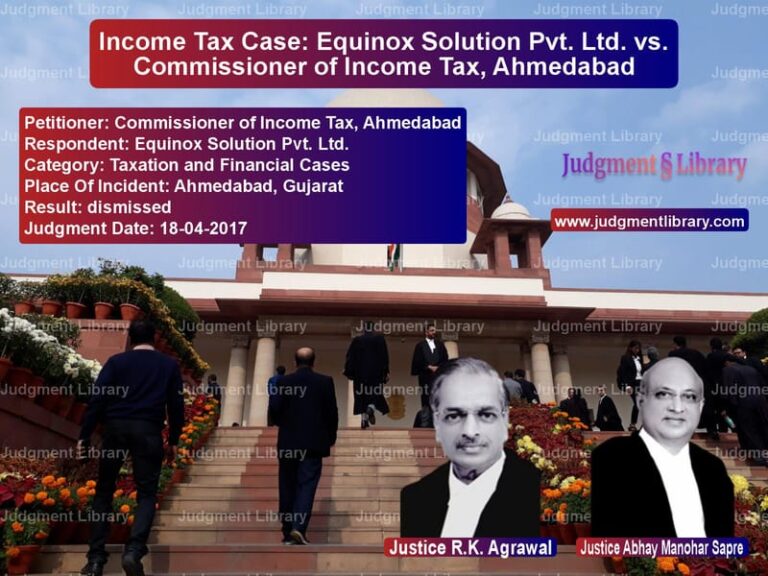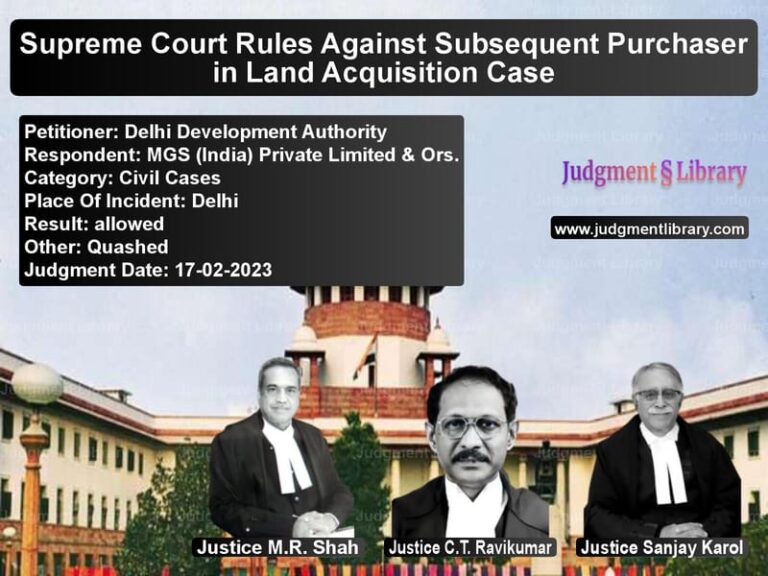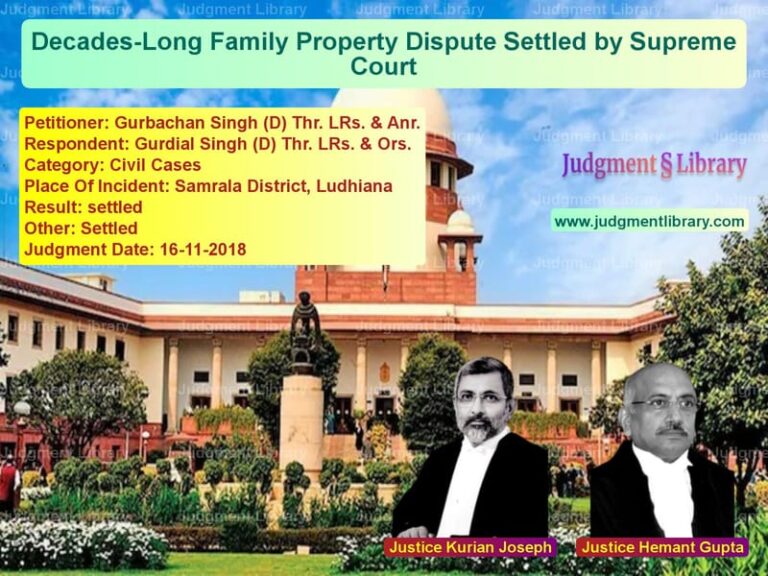Tenant’s Ownership Claim Dismissed: Supreme Court Restores Landlord’s Rights in Eviction Dispute
The case of Beena & Ors. vs. Charan Das (D) Thr. LRs. & Ors. revolved around a prolonged legal battle concerning the ownership and possession of a tenanted property. The Supreme Court ultimately ruled that a consent order from 1979 did not confer ownership rights to the tenant, overturning the High Court’s ruling and reinstating the judgments of the lower courts.
Background of the Case
The legal dispute originated as an eviction case between a landlord, Bhawani Parshad alias Bhagati Parshad, and his tenant, Charan Dass. The property in question consisted of a house with two rooms and a godown situated in Mohalla Charpat, Church Road, Chamba Town. The landlord had filed an eviction suit under Section 14 of the Himachal Pradesh Urban Rent Control Act, 1971, claiming that:
- The property was in a dilapidated condition and required demolition and reconstruction.
- The landlord had a bona fide need for the property.
During the legal proceedings, a settlement was reached between the parties on September 5, 1979, leading to a consent order.
Terms of the Consent Order
Under the terms of the settlement:
- The tenant, Charan Dass, agreed to deposit Rs. 12,500 in the court by December 15, 1979.
- If the tenant deposited the amount within the stipulated time, the landlord’s eviction application would be deemed dismissed.
- If the tenant failed to deposit the amount, the application for eviction would be deemed allowed, requiring the tenant to vacate the premises.
The tenant deposited the amount on September 6, 1979, the very next day, ensuring the dismissal of the eviction suit.
Subsequent Legal Disputes
Landlord’s Challenge
Despite the consent order, the landlord challenged it in the Himachal Pradesh High Court via Civil Revision No. 168/79. The High Court dismissed the revision on December 7, 1984, stating that the landlord’s appropriate remedy was to file an appeal under Section 21(1)(b) of the Act. A Special Leave Petition (SLP) against this decision was also dismissed, thereby finalizing the consent order.
Tenant’s Execution Petition
In an attempt to assert ownership, the tenant filed an execution petition, requesting the court to record his name as the owner. The Rent Controller allowed this request on August 28, 1989. However, the landlord challenged this decision, arguing that the execution petition was not a valid remedy.
The High Court, in revisional jurisdiction, ruled in favor of the landlord, holding that:
- The execution petition was not a proper legal recourse for the tenant.
- Since the building had collapsed, nothing remained to be recorded in the tenant’s name.
- The tenant should have pursued a separate civil suit instead of an execution petition.
Tenant’s Civil Suit for Ownership
Having lost in the execution proceedings, the tenant filed a suit for permanent mandatory injunction, possession, and recovery of Rs. 2,000. The landlord was listed as the defendant. The trial court dismissed the suit on July 16, 1994, a decision that was affirmed in the first appeal.
However, in a second appeal, the Himachal Pradesh High Court reversed the lower courts’ decisions, ruling that:
- The tenant had become the owner by virtue of the consent order.
- Since the tenant was dispossessed by the landlord, he was entitled to recovery of possession.
This High Court judgment led the landlord to appeal to the Supreme Court.
Supreme Court’s Judgment
1. Interpretation of the Consent Order
The Supreme Court ruled that the High Court had misinterpreted the consent order:
“The statements recorded in the Rent Controller’s order do not indicate a transfer of ownership. The agreement merely stipulated conditions for dismissing or allowing the eviction application.”
2. Absence of a Sale Agreement
The Court emphasized that the deposit of Rs. 12,500 did not equate to a sale or transfer of ownership:
“There was no document, much less a registered instrument, transferring the title of the suit premises from the landlord to the tenant.”
3. Invalidity of the Tenant’s Claim
The Court ruled that the tenant could not claim ownership based on the consent order:
“The consent order merely dictated the fate of the eviction suit and did not grant ownership rights to the tenant.”
4. Correction of the High Court’s Error
The Supreme Court found that the High Court had incorrectly assumed that the tenant’s payment made him the owner. It reinstated the decisions of the trial and appellate courts, which had dismissed the tenant’s ownership claim.
Final Verdict
The Supreme Court set aside the High Court’s judgment and restored the landlord’s rights. The tenant’s suit was dismissed, and the appeal was allowed with costs:
“The High Court patently erred in interpreting the consent order and reversing the well-considered judgments of the lower courts. The appeal is allowed.”
Implications of the Judgment
This ruling reaffirms critical principles of property law:
- Consent orders in eviction cases do not create ownership rights unless explicitly stated.
- A payment made in lieu of eviction does not imply property transfer in the absence of a registered sale deed.
- Tenants cannot claim ownership via execution petitions; they must pursue appropriate legal avenues.
- Landlord-tenant disputes must be resolved strictly per tenancy laws, without assuming implied property transfers.
The judgment safeguards landlords from unlawful ownership claims based on misconstrued consent orders, setting a precedent for similar property disputes.
Petitioner Name: Beena & Ors..Respondent Name: Charan Das (D) Thr. LRs. & Ors..Judgment By: Justice Pankaj Mithal, Justice R. Mahadevan.Place Of Incident: Chamba Town, Himachal Pradesh.Judgment Date: 11-09-2024.
Don’t miss out on the full details! Download the complete judgment in PDF format below and gain valuable insights instantly!
Download Judgment: beena-&-ors.-vs-charan-das-(d)-thr.-supreme-court-of-india-judgment-dated-11-09-2024.pdf
Directly Download Judgment: Directly download this Judgment
See all petitions in Property Disputes
See all petitions in Specific Performance
See all petitions in Judgment by Pankaj Mithal
See all petitions in Judgment by R. Mahadevan
See all petitions in allowed
See all petitions in Quashed
See all petitions in supreme court of India judgments September 2024
See all petitions in 2024 judgments
See all posts in Civil Cases Category
See all allowed petitions in Civil Cases Category
See all Dismissed petitions in Civil Cases Category
See all partially allowed petitions in Civil Cases Category

